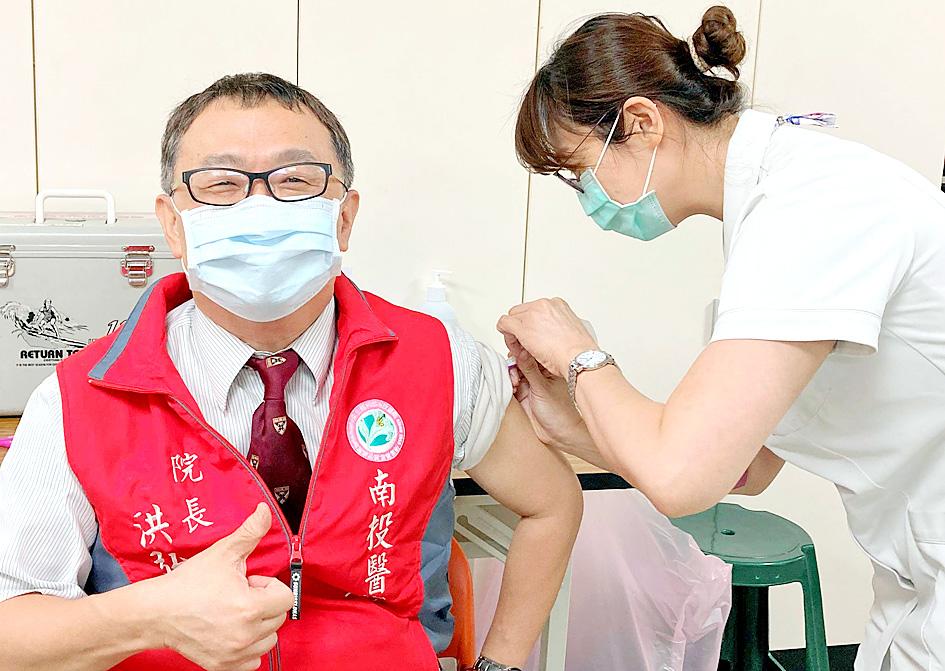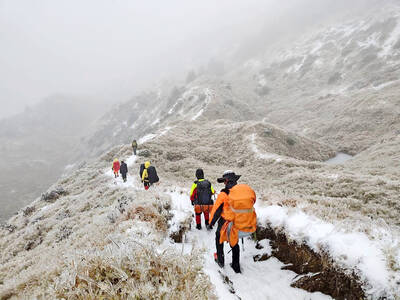Four deaths have been reported to the vaccine adverse event reporting system this year, the Centers for Disease Control (CDC) said yesterday, but added that its advisory specialist panel considered the causes to be associated with underlying health conditions, so the government’s flu vaccination program would continue.
CDC Deputy Director-General Chuang Jen-hsiang (莊人祥) said that an Advisory Committee on Immunization Practices and Vaccine Injury Compensation Program meeting was held on Monday evening to discuss the death of dozens of people in South Korea following the beginning of a seasonal flu vaccination program there.
The meeting also discussed several serious adverse events in people who received flu shots in Taiwan, after the government-funded flu vaccination program began on Oct. 5, he said.

Photo: Hsieh Chieh-yu, Taipei Times
Chuang said 76 claims of flu vaccine adverse events had been reported to the adverse event reporting system as of Monday, including 25 serious cases, 13 of whom involved prolonged hospital stay, life-threatening conditions or death.
The symptoms of the 13 serious cases included myocarditis, cellulitis, shock, difficulty breathing, acute myocardial infraction (heart attack), subarachnoid hemorrhage and acute cerebrovascular event (stroke), the CDC said.
People who claimed to have mild vaccine adverse events reported symptoms including dizziness, a headache, skin rashes, swollen skin and a fever, but the majority of them have recovered, it said.
Among the 13 serious cases, four people have died after receiving a flu shot, CDC physician Tsou Tsung-pei (鄒宗珮) said, adding that they were aged from 62 to 77, and died within three to 10 days after getting vaccinated.
She said three of them had received a flu shot manufactured by French pharmaceutical company Sanofi, but not from the same batch, and one received a shot made by local vaccine maker Adimmune Corp (國光生物科技).
The people were asked in advance if they had experienced serious adverse reactions after receiving a flu shot in the past, and whether they had a fever or a moderate or severe illness that should delay the vaccination, she said.
Tsou said the four died of cardiovascular events, including cerebral hemorrhage and myocardial infarction, and that the advisory specialists considered the events to be more likely caused by the individuals’ underlying health conditions, rather than adverse reactions to the flu vaccination.
Chuang said the specialists at the meeting also suggested that the CDC continue with the flu vaccination program, while closely following up on reported vaccine adverse events.
South Korean authorities have said the deaths there were not linked to flu vaccination and the nation’s vaccination program would continue, he said.
While Singapore has temporarily halted the use of two types of flu vaccines as a precaution, other countries have continued with their flu vaccination programs.
Tsou said the specialists think the benefits of continuing with the flu vaccination program outweigh the risks, as the vaccine adverse event claims were sporadic, not clustered, and the people did not receive vaccines from the same batch or experience similar symptoms.

Trips for more than 100,000 international and domestic air travelers could be disrupted as China launches a military exercise around Taiwan today, Taiwan’s Civil Aviation Administration (CAA) said yesterday. The exercise could affect nearly 900 flights scheduled to enter the Taipei Flight Information Region (FIR) during the exercise window, it added. A notice issued by the Chinese Civil Aviation Administration showed there would be seven temporary zones around the Taiwan Strait which would be used for live-fire exercises, lasting from 8am to 6pm today. All aircraft are prohibited from entering during exercise, it says. Taipei FIR has 14 international air routes and

The Ministry of National Defense (MND) today released images of the military tracking China’s People's Liberation Army (PLA) movements during the latest round of Chinese drills around Taiwan. The PLA began "Justice Mission 2025" drills today, carrying out live-fire drills, simulated strikes on land and maritime targets, and exercises to blockade the nation's main ports. The exercises are to continue tomorrow, with the PLA announcing sea and air space restrictions for five zones around Taiwan for 10 hours starting from 8:30am. The ministry today released images showing a Chinese J-16 fighter jet tracked by a F-16V Block 20 jet and the

Snow fell on Yushan (Jade Mountain, 玉山) yesterday morning as a continental cold air mass sent temperatures below freezing on Taiwan’s tallest peak, the Central Weather Administration (CWA) said. Snowflakes were seen on Yushan’s north peak from 6:28am to 6:38am, but they did not fully cover the ground and no accumulation was recorded, the CWA said. As of 7:42am, the lowest temperature recorded across Taiwan was minus-5.5°C at Yushan’s Fengkou observatory and minus-4.7°C at the Yushan observatory, CWA data showed. On Hehuanshan (合歡山) in Nantou County, a low of 1.3°C was recorded at 6:39pm, when ice pellets fell at Songsyue Lodge (松雪樓), a

NO SHAME IN RETREAT: Hikers should consider turning back if the weather turns bad or if they do not have sufficient equipment, the Taroko park headquarters said Two people died of hypothermia over the weekend while hiking on Hsuehshan (雪山), prompting park authorities to remind hikers to bring proper equipment and consider their physical condition before setting out in the cold weather. Temperatures dropped over the weekend, bringing snow to high altitudes in Shei-pa National Park. One hiker, surnamed Lin (林), who on Friday was traveling with a group of six along the Hsuehshan west ridge trail, lost consciousness due to hypothermia and died, the Shei-pa National Park Headquarters said. On Saturday, another hiker, surnamed Tien (田), in a group of five on the southeast of the west